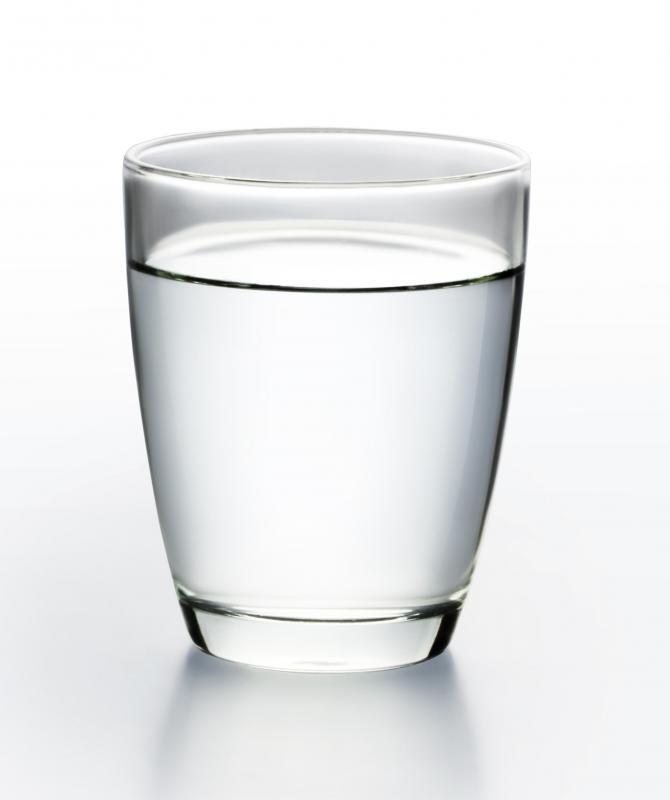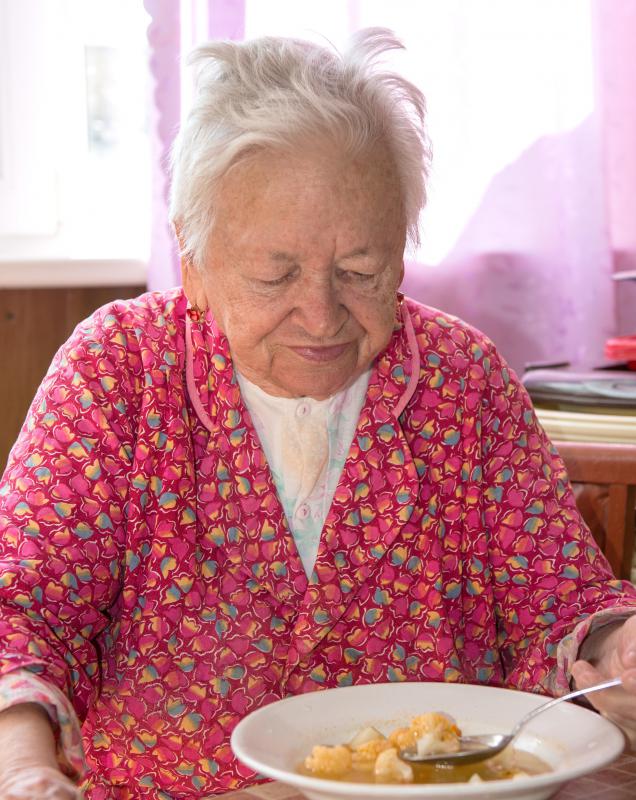At WiseGEEK, we're committed to delivering accurate, trustworthy information. Our expert-authored content is rigorously fact-checked and sourced from credible authorities. Discover how we uphold the highest standards in providing you with reliable knowledge.
What are the Signs of Dehydration in the Elderly?
Dehydration is the lack of fluid or loss of fluid from the body, which can often impair the body's normal functions. Lack of fluid may occur when there is inadequate water intake, especially during hot temperatures. Loss of fluid from the body is often a result of vomiting, use of certain medications, heavy sweating, and diarrhea. The signs of dehydration in the elderly are sometimes less observable than in the younger individuals. These include loss of skin elasticity and shrunken eyes. Many dehydrated patients, including the elderly and the young, may also experience dizziness, decreased urine output, low blood pressure, and development of urinary tract infection (UTI).
In young adults, one sign of dehydration is wrinkling or decreased elasticity of the skin. Older individuals generally have wrinkled skin, so these signs can frequently be less noticeable in them. A way to test for dehydration in the elderly is by pulling the skin of the hand and releasing it. The skin should quickly return to its normal position, and failure to do so may be a sign of dehydration. Some frail elderly also appear to have shrunken eyes, thus many caregivers may not interpret this as a sign of elderly dehydration.

When the body lacks fluid, the urine output also decreases. The color of urine often becomes darker and more concentrated when someone is dehydrated. Constipation may also occur due to less fluid to soften the stool. Aside from these, dehydration in the elderly may also cause fever, dryness of the eyes, and mouth, and absence of sweat. Signs of severe dehydration can frequently lead to severe muscle cramps, confusion, loss of consciousness, and convulsions.

Many elderly men and women also are prone to other health problems, such as diabetes, high blood pressure, and stroke. They may be taking medications that can lead to dehydration, and this can further complicate their conditions. Another factor that may contribute to dehydration in the elderly is weakness due to their age, which makes them less able to get water frequently. Their sense of thirst may also be decreased, thus, they may not feel the need to drink as often as needed. For these reasons it is important for caregivers and family members to know how to look for the symptoms and signs of dehydration in the elderly.

The best way to prevent dehydration in the elderly is to make sure they are given an adequate amount of water every day. They should also be encouraged to drink water often, and provided with drinking water and soup within easy reach. When vomiting, diarrhea, or infections occur, treatment and fluid replacement should be promptly sought.
AS FEATURED ON:
AS FEATURED ON:


















Discussion Comments
@Ruggercat68- I understand what you're going through. My dad passed out last summer and I had to take him to the ER. The doctor said it was severe dehydration. I just assumed he was doing everything he was supposed to do to keep healthy, including drinking more liquids during the hot months. I don't believe he even realized how dehydrated he truly was. He said he never really felt overly thirsty, and he'd get busy in his workshop and forget to drink something.
I wish the signs of dehydration in the elderly were a little more obvious sometimes. I can usually tell if my dad's getting dehydrated by looking at the skin around his eyes, but I can't force him to do anything about it. I just buy cases of bottled water and keep them in his refrigerator.
My elderly mother-in-law has all these signs of dehydration for years. Just about every time we've had to take her to the emergency room for other reasons, the first thing the doctor will do is start her on IV fluids. Sometimes the problems she's having, like muscle cramps and confusion, can be traced directly back to severe dehydration.
We have tried many times to convince her to drink more fluids, but she refuses to change her daily routine. She claims to hate the taste of water, even if we invest in the best bottled spring water available. She considers her one cup of coffee in the morning to be an acceptable amount of fluid until lunch time. It's a constant struggle for us to keep her from becoming dehydrated again.
Post your comments